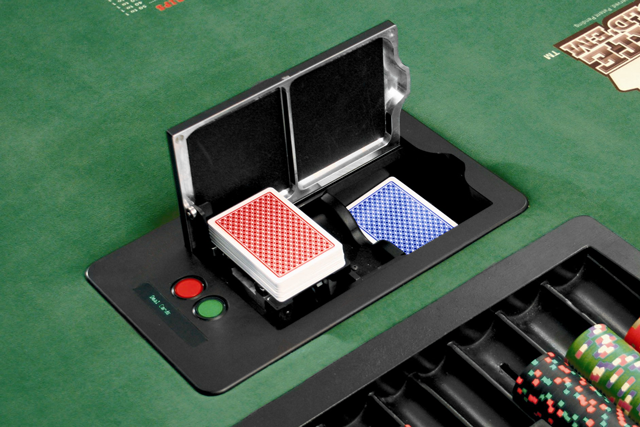






Poker Shuffler Maker Hit With $315M Verdict In Antitrust CaseLawsuit: Firm Performed 'Sham Litigation' To Maintain Market Dominance |
|
|

A federal jury in Illinois issued a verdict Tuesday against Las Vegas’ Scientific Games Corp. after the court heard that the firm illegally tried to stifle competition in the gaming sector.
A $315 million verdict in the antitrust case was returned in favor of a group of firms led by Chicago-based Shuffle Tech International. They said that Scientific Games engaged in a “pattern of sham litigation” in order to protect its market share.
Scientific asserted “objectively baseless claims to enforce patents known to be invalid and/or not infringed, all with the intent to directly interfere with and adversely affect the business operations of competitors, and to unlawfully obtain and maintain monopolistic control over the U.S. market for automatic card shufflers designed for casino use,” according to the 2015 complaint.
Scientific “fraudulently procured” patents for its card shufflers, per the lawsuit.
In a statement, Scientific said that it will challenge the $315 million verdict.
“In October 2015, the district court dismissed all of the plaintiffs’ claims with prejudice, except for the claims of violation of antitrust laws related to the fraudulent procurement of patents on card shufflers. A jury trial began on July 16, 2018 and ended on August 7, 2018. On August 7, 2018, the jury returned a verdict for the plaintiffs. The jury awarded plaintiffs $105 million in compensatory damages, which is subject to trebling, as well as attorneys fees and costs. The Company believes the jury reached the wrong result and will seek review of both the finding of liability and the damages award, both before the trial court and, if necessary, on appeal.”
SHFL Entertainment (formerly known as Shuffle Master), which became part of Scientific Games in 2014, controls “100%” of the “relevant U.S market” for the devices, the suit said. As of just a handful of years ago, the market for the devices and related services was about $100 million per year, according to the suit.
Scientific’s “Deck Mate” automatic shuffler is the device used at the World Series of Poker.
Shuffle Tech, founded in 2006, said that it could make a better shuffler and for cheaper, which drove Scientific to illegal practices, the suit said. SHFL sold shufflers for an average price of about $16,000 in 2012, in addition to leasing them for an average cost of $450 per month.
Shuffle Tech said that it and its partners were planning to sell their devices for about $11,000. “Recognizing the threat of Shuffle Tech’s improved technology and lower prices, SHFL immediately, on Oct. 12, 2012, filed a sham patent infringement lawsuit,” the suit said.
Nearly $1 million was spent fighting the sham litigation, Shuffle Tech said in 2015. However, the firm claims the damage done to the market is “incalculable.”
Scientific’s “monopoly and market power in the relevant market has not occurred by virtue of superior acumen, innovation, skill, foresight, or industry, or by the proper functioning of the market, or by natural market conditions,” the suit said. “Instead, it has occurred as the result of SHFL’s, Bally’s, and [Scientific’s] purposeful abuse of the patent system and the judicial process. For more than a decade, [Scientific], initially through SHFL and Bally, has engaged in a series of sham patent infringement lawsuits against every potential competitor that has marketed competitive card shufflers to casinos in the United States.”
Shuffle Tech claimed that “no potential competitor can enter the card shuffler business without a multi-million dollar war chest.”
